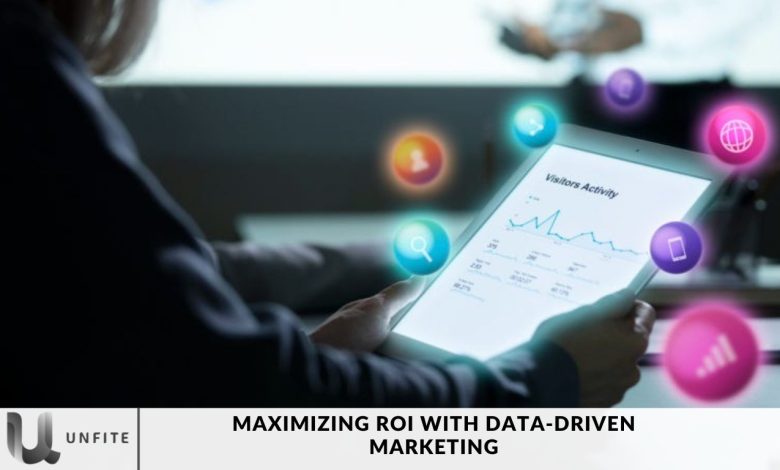Maximizing ROI with Data-Driven Marketing

In today’s competitive landscape, businesses can no longer afford to rely on guesswork when it comes to marketing decisions. Data-driven marketing offers a way to make more informed, strategic choices that directly impact your bottom line. By using data to guide your efforts, you can better understand your customers, optimize your campaigns, and ultimately maximize your return on investment (ROI). So, how can businesses embrace data-driven marketing to improve their outcomes? Let’s explore the key steps and benefits.
What is Data-Driven Marketing?
Data-driven marketing is the practice of leveraging data insights to inform your marketing strategies and decisions. Instead of relying on intuition or assumptions, marketers use real-time data from customer interactions, behaviors, and preferences to create more targeted and effective campaigns. This approach not only improves accuracy but also allows businesses to fine-tune their efforts over time, leading to higher efficiency and better results.
Data-driven marketing can involve various types of data, such as customer demographics, website analytics, email open rates, and social media engagement. The goal is to gather and analyze this data to create more personalized marketing messages, improve the customer experience, and increase conversion rates.
Identifying the Right Metrics
The first step in any data-driven marketing strategy is knowing which metrics to track. It’s easy to get overwhelmed by the sheer volume of available data, but not all of it is relevant to your goals. Start by identifying key performance indicators (KPIs) that directly align with your business objectives. Are you looking to increase sales? Grow your email list? Boost brand awareness? The metrics you choose should reflect these goals.
For example, if you’re focused on growing your customer base, you might track metrics like website traffic, lead generation, or customer acquisition cost (CAC). If your goal is to build brand loyalty, customer retention rates and net promoter score (NPS) might be more relevant. By narrowing your focus to the most important data points, you can gain valuable insights without getting lost in the noise.
Leveraging Customer Data for Personalization
One of the biggest advantages of data-driven marketing is the ability to personalize your messaging. With access to detailed customer data, businesses can tailor their content to resonate more effectively with their audience. Personalization helps build stronger relationships, improves engagement, and leads to higher conversion rates.
Imagine you’re running an email campaign. Instead of sending the same generic message to your entire list, you can use customer data to segment your audience based on their behaviors or preferences. A customer who has previously purchased a specific product may receive an email promoting complementary items, while a new subscriber might get a welcome message with an introductory offer. This level of personalization not only makes your marketing more relevant but also increases the likelihood that customers will take action.
An industrial marketing agency, for instance, could use data to identify which sectors of manufacturing its clients belong to and create targeted ads or content that speaks directly to the unique challenges those clients face. By addressing specific pain points, they can create more meaningful connections and ultimately drive better results.
Optimizing Campaigns in Real-Time
Another key benefit of data-driven marketing is the ability to adjust your campaigns in real time. Gone are the days of setting up a campaign and hoping for the best. With access to real-time data, marketers can monitor the performance of their efforts and make adjustments on the fly. Whether it’s tweaking ad copy, reallocating budget, or refining your targeting, data allows you to stay agile and responsive.
For example, if you notice that a particular social media ad isn’t generating the expected engagement, you can quickly pivot by adjusting the targeting or creative elements. Similarly, if you see that a certain segment of your email list is opening messages at a much higher rate, you can create more tailored content to keep them engaged. This kind of flexibility helps maximize your ROI by ensuring you’re always optimizing for the best results.
Enhancing Customer Experience with Data
Customer experience is becoming one of the most important factors in driving loyalty and long-term success. Data-driven marketing enables businesses to create seamless, personalized experiences at every touchpoint. From personalized product recommendations on your website to targeted ads that appear when a customer is most likely to convert, data allows you to craft a more cohesive and customer-focused journey.
Additionally, using customer data to understand pain points or friction in the customer journey can help you improve the overall experience. For example, if analytics show that customers are abandoning their shopping carts on a particular page, you can investigate why and make changes to improve the checkout process. Small tweaks based on data insights can make a big difference in creating a smoother, more enjoyable customer experience.
Measuring the Impact on ROI
The beauty of data-driven marketing is that it’s measurable. By tracking the right metrics, you can see how your efforts are impacting your bottom line. Are your marketing campaigns generating more leads? Is your customer acquisition cost decreasing? Is your email marketing producing higher conversion rates? With data in hand, you can quantify the effectiveness of your strategies and make data-driven decisions to improve your ROI over time.
Data also helps you identify what’s working and what’s not. By analyzing the performance of your campaigns, you can focus more resources on high-performing strategies and cut back on efforts that aren’t yielding results. This level of accountability ensures that you’re making the most of your marketing budget.
Conclusion
Data-driven marketing is more than just a trend—it’s a necessity for businesses looking to maximize their ROI and stay competitive in the digital age. By using data to inform your marketing decisions, you can create more personalized experiences, optimize campaigns in real time, and continuously improve your outcomes. Whether you’re a small business or a large enterprise, embracing a data-driven approach can lead to smarter marketing strategies, better customer engagement, and ultimately, higher returns on your investment.
Are you ready to take your marketing to the next level? The data you need to make it happen is right at your fingertips.




